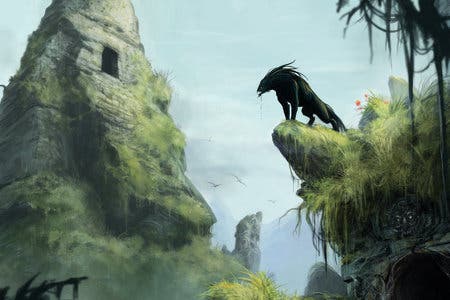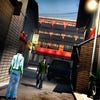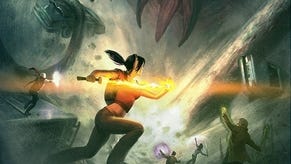The Secret World Review
Everything is illuminated.
Everyone's in on the secret, but no-one wants to share. That's the impression you get when playing The Secret World, the new massively multiplayer game with a conspiratorial modern-day setting in which secret societies and sinister corporations engage in a covert, occult war.
It's not really that covert, since every other character you meet seems to be on first-name terms with the Illuminati, conversant in Crowley and fully aware of your status as a nascent superhero tackling the dark forces threatening the planet. The roads teem with other players: Eurotrash vigilantes and magi in sportswear, wielding semi-automatics and spells against the nameless horrors creeping out of the fog.
But everyone's on their own private errand. No-one's talking or helping or simply hanging out, because the game too seldom gives them a good enough reason to.
Good solo play has been a cornerstone of successful MMOs for years, and quite right too; doing your own thing alongside a world of others is an underrated pleasure. The increasing focus on it in games like Star Wars: The Old Republic doesn't do much more harm than sound the occasional conceptual bum note.
But The Secret World's problems run deeper than that. It has the multiplayer content - dungeons climaxing in testing boss encounters (strong), a few player-versus-player game modes (sloppy) - but they're free-floating, connected to the rest of the game by umbilical strands of story but little sense of community and a lack of commitment to the massively multiplayer dream.
When you're asking players to pay a subscription of £11.49 a month, that's a big problem. It doesn't help that the launch game is quite buggy and just scraping the minimum amount of content you need to qualify as a "premium" MMO, although developer Funcom is promising monthly updates.
Is it worth trying it out for that first, free month, though? That's an altogether different question, and the answer is a qualified but encouraging 'yes'.
The Secret World earns tremendous goodwill just by daring to be different in one of the most staid game genres there is. It's a little self-consciously alternative in places and the typically sludgy grind of the hotkey-bashing combat seems like laggardly conservatism amid all the invention on display. But still, anyone who's been following MMOs for the last decade will want to take a big gulp of Funcom's fresh air.
It gets the most mileage by far out of the setting cooked up by director Ragnar Tornquist and his writing team. It's simply refreshing not to find yourself in a trad fantasy milieu, but The Secret World goes above and beyond with its characterful and witty set-up. It's a kitchen-sink pop-culture compendium of The X-Files, Hellblazer, Doctor Who, Lovecraft, Whedon, Gaiman and dozens more, delivered with a lovable light touch and lack of restraint. Most MMOs take their fictions too seriously, and that would have been an easy trap for Funcom to fall into, but this is a fun place to be.
Everyone's on their own private errand. No-one's talking or helping or simply hanging out, because the game too seldom gives them a good enough reason to.
The quality of the dialogue and voice-acting is noteworthy - or rather, the monologue, as missions are delivered to your awkwardly mute character by a gallery of memorable, loquacious oddballs. They're over-written sometimes, and almost always overlong, but entertaining nonetheless - and much less dry than The Old Republic's attempt to add cinematic scenes to the MMO lexicon. There's also a wealth of pleasingly interconnected detail to dig out of collectable lore snippets, posters, missions logs and the like.
Detail is the game's hallmark, in fact. Funcom has bucked another MMO trend and bravely spent its world-building efforts at this granular level rather than going for sheer scale. It works. Although The Secret World doesn't quite deliver on its globe-trotting premise - you'll spend your adventuring time in small chunks of New England, Egypt and Transylvania as well as the hub cities of London, New York and Seoul - each location feels intimate and crafted. Lovely touches abound, like the radio in the London Underground station intoning the shipping forecast.
The missions are better framed than they are designed, but they do offer good variety and describe interesting routes around the maps. In addition to your current story mission, you can only hold one major mission and three side missions at a time - a risky but susccessful attempt to persuade players to follow the storylines through rather than go for optimised, mindless multi-tasking in their questing.
Action missions and side missions are your MMO staple: errand-running padded out with lots of that lacklustre combat. Investigations are the star turn, focusing on exploration and riddle-solving that will sometimes send you out of the game to Google (though a neat in-game browser is thoughtfully provided); they can be maddeningly obtuse, but it's a great novelty for an MMO to offer this more relaxed and cerebral style of play. Sabotage missions, which focus on stealth and navigating traps, are an overreaching attempt to do action gameplay which the unrefined controls can't deliver.
The Secret World's next risky re-invention is in character progression, which (ostensibly) abandons levels and classes in favour of equipment upgrades and free-form exploration of its ability "wheel". It is liberating - but it's also unfocused and renders several aspects of the game more opaque than they need to be.
As you earn experience, you're rewarded with Skill and Ability points; the former are used to unlock new levels of gear and stat boosts, the latter to buy abilities related to nine weapon classes across melee, guns and magic. You then slot seven active and seven passive abilities, tied to your current weapon choice, into custom 'decks' that can be switched when you want to change play style. This highly flexible and clutter-free approach to skill decks, shared with the forthcoming Guild Wars 2, is clearly the way forward for MMOs.
It's a kitchen-sink pop-culture compendium of The X-Files, Hellblazer, Doctor Who, Lovecraft, Whedon, Gaiman and dozens more, delivered with a lovable light touch and lack of restraint.
The great advantage of this progression system is that you can explore every gameplay style The Secret World has to offer on a single character. Even better, thanks to the escalating points rewards, you can progress very quickly through earlier tiers if you decide to re-specialise later in the game.
But the skills themselves are an impenetrable mess of MMO jargon, and if you want to join in with group play you'll need to unearth the class archetypes - tank, healer, crowd control and so on - buried somewhere in this tangle. It practically demands a degree in the linguistics and archeology of role-playing games. (Funcom does suggest a few builds to follow, at least.)
Really, it's disguised levelling rather than the absence of it, and the trade-off for that freedom is never knowing quite where you stand. Am I ready for this dungeon? Can I take on that player? Will I pass the invisible gate to the next zone? Who knows? You'll need to head to the forum to find out, and it's telling that the community, after months of beta, still only has a rough idea how it all works.
It's a mechanically arcane game that, at the highest level, is tailored for the hardcore player of online RPGs. There's potential in the system, but it's disappointingly hostile to curious players who might be drawn in by The Secret World's unique premise and abundance of solo quests.
Sadly, that unfriendliness is reinforced by a game that simply doesn't encourage social play. You won't find any elite zones or roaming world bosses to throw players together. There isn't a compelling reason to mill, chat and trade in the cities, which are handsomely mounted but lacking in amenities and distractions. There's no group-finding tool. The only option is to dive in at the deep end by responding to one of the incomprehensible strings of acronyms in the chat channel that starts with "LFG".
When you pluck up the courage, you'll find dungeons that are dynamic, tactical and fun; if you've played Age of Conan recently, you'll know that Funcom has made good strides in the art of encounter design. Player-versus-player is a rougher ride. There's little in the game world to encourage you to do it, and there are agonisingly long queues to get into two scrappy, unoriginal and poorly-balanced battlefields, Stonehenge and El Dorado.
No such problem with Fusang, although it will be a while before you get to grips with this large, persistent warzone - and probably even longer before Funcom gets to grips with it. Population imbalances between the three player factions - decandent Illuminati, righteous Templars and, er, unpopular Dragon - is a problem in all three modes, but in Fusang in particular. Still, it has promise, and more closely resembles actual massively multiplayer combat than most games' PVP offerings.
That's the strange thing about this game. There is a real MMO in there - a secret world within The Secret World - but it's estranged from the player, clouded by obfuscating systems and smothered in charismatic but stolidly single-player adventuring. Tornquist is a writer, the man behind adventure games The Longest Journey and Dreamfall, and it seems like he's more interested in telling stories than building adventure playgrounds, never mind emergent worlds.
They're good stories, though, and The Secret World's abundant charm and willingness to strike out in its own direction go a long way. For many, it will be more appealing than the fully-featured but bloodless Old Republic. I can't say I'd blame them.
But at over £10 a month, others might ask for something more substantial and cohesive for their money, and I can't say I'd blame them either. Many of the issues are fixable, the update programme is impressive on paper, and Funcom is the studio that turned Age of Conan around - so it's not impossible that The Secret World will fulfil its potential. But as it stands, it's still a few steps short of being the saviour that massively multiplayer gaming so badly needs.



































